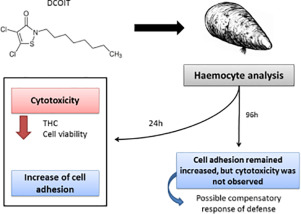当前位置:
X-MOL 学术
›
Comp. Biochem. Physiol. C Toxicol. Pharmacol.
›
论文详情
Our official English website, www.x-mol.net, welcomes your feedback! (Note: you will need to create a separate account there.)
Effects of DCOIT (4,5-dichloro-2-octyl-4-isothiazolin-3-one) to the haemocytes of mussels Perna perna.
Comparative Biochemistry and Physiology C: Toxicology & Pharmacology ( IF 3.9 ) Pub Date : 2020-03-03 , DOI: 10.1016/j.cbpc.2020.108737 Viviane Barneche Fonseca 1 , Amanda da Silveira Guerreiro 1 , Marcelo Alves Vargas 2 , Juliana Zomer Sandrini 2
Comparative Biochemistry and Physiology C: Toxicology & Pharmacology ( IF 3.9 ) Pub Date : 2020-03-03 , DOI: 10.1016/j.cbpc.2020.108737 Viviane Barneche Fonseca 1 , Amanda da Silveira Guerreiro 1 , Marcelo Alves Vargas 2 , Juliana Zomer Sandrini 2
Affiliation

|
Bivalve molluscs rely only on an innate immune system to execute cellular and humoral processes. Haemocytes, the haemolymph circulating cells, play a major role in this type of immunity, principally regarding cellular defences. Considering that environmental pollutants can affect the immune system of invertebrates, this work evaluated the effects of the antifouling biocide 4,5-dicloro-2-n-octil-4-isotiazolin-3-ona (DCOIT) on the haemocytes of mussels Perna perna. Individuals were exposed to 0 (control), 0.1 μg L-1 and 10 μg L-1 of DCOIT for up to 96 h. The analysed parameters included: total (THC) and differential (DHC) haemocyte count, cellular viability, adhesion capacity, phagocytic activity, levels of reactive oxygen species and DNA damage. Moreover, the stress on stress (SOS) response of mussels was analysed as a general stress index. The results show that DCOIT increased the haemocyte adhesion capacity and caused a decrease in THC and in the haemocyte viability after 24 h of exposure. After 96 h of exposure, DCOIT only affected the haemocyte adhesion capacity, which was decreased by biocide exposure. Moreover, exposure to DCOIT for 96 h did not affect the capacity for air survival of mussels. These results indicate that DCOIT interferes in important parameters associated with the innate immunity of P. perna, mainly after 24 h of exposure. It is suggested that the animals were able to develop some compensatory response strategy, making them more resistant to the biocide.
中文翻译:

DCOIT(4,5-dichloro-2-octyl-4-isothiazolin-3-one)对贻贝Perna perna血细胞的影响。
双壳类软体动物仅依靠先天免疫系统来执行细胞和体液过程。血细胞(血淋巴循环细胞)在这种类型的免疫中起主要作用,主要在细胞防御方面。考虑到环境污染物会影响无脊椎动物的免疫系统,这项工作评估了防污杀虫剂4,5-二氯-2-正辛基-4-异噻唑啉-3-ona(DCOIT)对贻贝贻贝血细胞的影响。将个体暴露于0(对照),0.1μgL-1和10μgL-1的DCOIT中长达96小时。分析的参数包括:总(THC)和差异(DHC)血细胞计数,细胞生存力,粘附能力,吞噬活性,活性氧水平和DNA损伤。此外,分析了贻贝对应激(SOS)响应的应激作为一般应激指标。结果表明,DCOIT暴露24 h后可增加血细胞粘附能力,并导致THC和血细胞活力降低。暴露96 h后,DCOIT仅影响血细胞粘附能力,而暴露于杀生物剂后血红细胞粘附能力降低。此外,暴露于DCOIT 96小时不会影响贻贝的空气存活能力。这些结果表明,DCOIT主要在暴露24 h后干扰与多年生疟原虫先天免疫相关的重要参数。提示这些动物能够制定一些补偿性反应策略,使其对杀生物剂更具抵抗力。DCOIT仅影响血细胞粘附能力,由于杀生物剂暴露而降低。此外,暴露于DCOIT 96小时不会影响贻贝的空气存活能力。这些结果表明,DCOIT主要在暴露24 h后干扰与多年生疟原虫先天免疫相关的重要参数。提示这些动物能够制定一些补偿性反应策略,使其对杀生物剂更具抵抗力。DCOIT仅影响血细胞粘附能力,由于杀生物剂暴露而降低。此外,暴露于DCOIT 96小时不会影响贻贝的空气存活能力。这些结果表明,DCOIT主要在暴露24 h后干扰与多年生疟原虫先天免疫相关的重要参数。提示这些动物能够制定一些补偿性反应策略,使其对杀生物剂更具抵抗力。
更新日期:2020-03-03
中文翻译:

DCOIT(4,5-dichloro-2-octyl-4-isothiazolin-3-one)对贻贝Perna perna血细胞的影响。
双壳类软体动物仅依靠先天免疫系统来执行细胞和体液过程。血细胞(血淋巴循环细胞)在这种类型的免疫中起主要作用,主要在细胞防御方面。考虑到环境污染物会影响无脊椎动物的免疫系统,这项工作评估了防污杀虫剂4,5-二氯-2-正辛基-4-异噻唑啉-3-ona(DCOIT)对贻贝贻贝血细胞的影响。将个体暴露于0(对照),0.1μgL-1和10μgL-1的DCOIT中长达96小时。分析的参数包括:总(THC)和差异(DHC)血细胞计数,细胞生存力,粘附能力,吞噬活性,活性氧水平和DNA损伤。此外,分析了贻贝对应激(SOS)响应的应激作为一般应激指标。结果表明,DCOIT暴露24 h后可增加血细胞粘附能力,并导致THC和血细胞活力降低。暴露96 h后,DCOIT仅影响血细胞粘附能力,而暴露于杀生物剂后血红细胞粘附能力降低。此外,暴露于DCOIT 96小时不会影响贻贝的空气存活能力。这些结果表明,DCOIT主要在暴露24 h后干扰与多年生疟原虫先天免疫相关的重要参数。提示这些动物能够制定一些补偿性反应策略,使其对杀生物剂更具抵抗力。DCOIT仅影响血细胞粘附能力,由于杀生物剂暴露而降低。此外,暴露于DCOIT 96小时不会影响贻贝的空气存活能力。这些结果表明,DCOIT主要在暴露24 h后干扰与多年生疟原虫先天免疫相关的重要参数。提示这些动物能够制定一些补偿性反应策略,使其对杀生物剂更具抵抗力。DCOIT仅影响血细胞粘附能力,由于杀生物剂暴露而降低。此外,暴露于DCOIT 96小时不会影响贻贝的空气存活能力。这些结果表明,DCOIT主要在暴露24 h后干扰与多年生疟原虫先天免疫相关的重要参数。提示这些动物能够制定一些补偿性反应策略,使其对杀生物剂更具抵抗力。



























 京公网安备 11010802027423号
京公网安备 11010802027423号